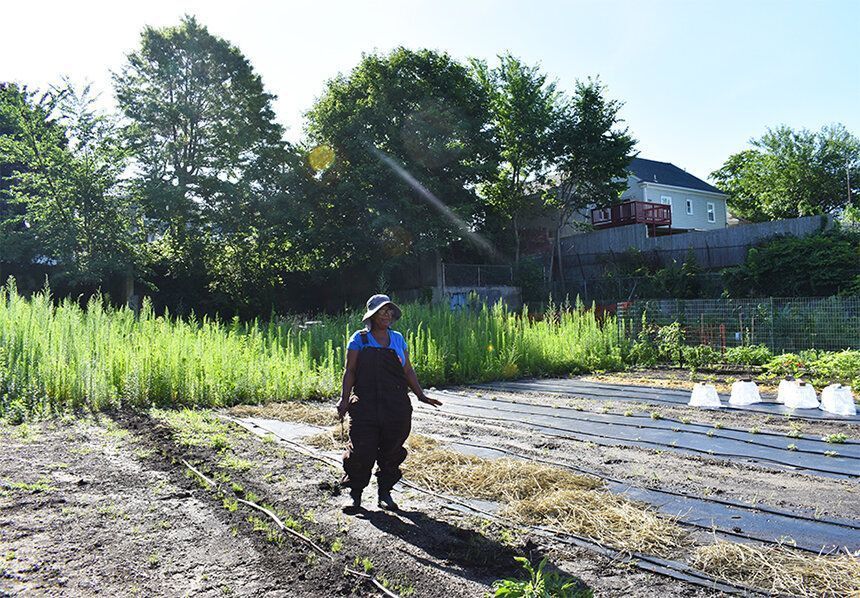
Farming While Black (in Rhode Island)
In 2017, there were just nine black farmers in Rhode Island. Frustrated with that statistic, Quatia “Q” Osorio became a farmer herself, and single-handedly brought the number into the double digits. Since 2018, she has been farming two pieces of property she owns in Providence.
The story of farming in the United States — and in Rhode Island — is fraught for Black people, as it was built on the forced labor and agricultural knowledge of enslaved Africans.
“I am a direct descendant of slaves,” Osorio said. “My family genealogy starts down at the plantations, to the boat we came off in South Carolina. So just knowing that my history has always been tied to the land, it just felt natural. It wasn’t traumatizing, and I realized I didn’t have to feel like I was toiling and slaving under the sun for anyone.”
In 1920, 14% of US farm workers were Black, and they held 15 million acres of farmland. Today, a mere 1% of US farmland is owned by Black farmers, and in Rhode Island, as of 2017, that number is even lower, at 0.7%, according to the latest Rhode Island Census of Agriculture.
Bus-ting Up Kennedy Plaza
Efforts to decentralize Kennedy Plaza, the state’s centralized bus hub, have been in the works for years.
During the past four years, two proposals to reduce or eliminate bus stops in Kennedy Plaza were put forth by the Rhode Island Department of Transportation (RIDOT) and the Rhode Island Public Transit Authority (RIPTA). But a third, new plan is in the works, and some RIPTA riders aren’t happy about it.
The latest plan proposed by RIPTA and RIDOT would disperse the main bus hub at Kennedy Plaza to three locations.
In a document stating its opposition to the plan, the Rhode Island Transit Riders claim: The reorganized Kennedy Plaza would be “inconvenient for passengers;” would move half of all bus lines from Kennedy Plaza to a “remote and inappropriate location;” is a “waste of money;” would “short-change the rest of the state;” and “privileges the voices of the powerful over the less-powerful.”
This multi-hub plan is being presented by RIDOT as a way to “bring employees closer to jobs while eliminating crowding experienced by having one hub.”
Scrap Processor Fined for Toxic Auto Fluff
After failing to obtain permits and install pollution-control equipment, a scrap-metal processor in Johnston was fined at least $875,000 for emitting volatile organic compounds and other pollutants linked to health problems.
It’s the largest penalty ever assessed by the state of Rhode Island for violations of the Clean Air Act.
The Johnston site, which ironically is on Green Earth Avenue, sorts and shreds automobiles, appliances and other metals.
Workers at businesses in the area had long complained of breathing problems and eye and throat irritation. “Auto fluff,” plastics and other debris from the shredding process, was found on nearby properties. Testing found excessive levels of mercury, cadmium, lead and other pollutants.
East Providence Senator Threatens to Sue … East Providence
Since the initial plans for the redevelopment of the Metacomet Golf Course in East Providence went public in June, most of the neighborhood response has been critical of the proposal by Pawtucket-based Marshall Properties to turn much of the 138-acre property into stores, offices, and apartments.
Sen. William J. Conley Jr., D-East Providence, who is serving as the project developer’s lead attorney claimed there is not conflict of interest, even though Conley pushed for a special federal designation that Marshall Properties (his client) may benefit from if the property is rezoned.
At a recent public hearing, Conley, chairman of the Senate Committee on Finance, made a veiled threat of legal action if the City Council doesn’t follow the recommendation of the Planning Board and approve changing the zoning for the property from open space to a designation that allows commercial and residential construction.
For detail on these stories, and to get more of the latest environmental news, visit www.ecoRI.org. Subscribe to ecoRI News’ free weekly e-newsletter at www.ecoRI.org/subscribe.